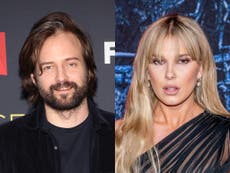There’s an underlying toxicity to season four of Stranger Things
It’s ironic that we keep doing this to celebrities, particularly famous women, and then wonder why society has a massive self-esteem issue on its hands

Your support helps us to tell the story
From reproductive rights to climate change to Big Tech, The Independent is on the ground when the story is developing. Whether it's investigating the financials of Elon Musk's pro-Trump PAC or producing our latest documentary, 'The A Word', which shines a light on the American women fighting for reproductive rights, we know how important it is to parse out the facts from the messaging.
At such a critical moment in US history, we need reporters on the ground. Your donation allows us to keep sending journalists to speak to both sides of the story.
The Independent is trusted by Americans across the entire political spectrum. And unlike many other quality news outlets, we choose not to lock Americans out of our reporting and analysis with paywalls. We believe quality journalism should be available to everyone, paid for by those who can afford it.
Your support makes all the difference.A lot of good things have come from the latest season of Stranger Things, but the way fans are pitting its female cast against each other isn’t one of them.
There’s no escaping the hype around season four of Stranger Things – love it or hate it, the latest series has broken the internet with its emotional rollercoaster (quite literally, Netflix experienced 13,000 outages as fans tried to tune in at 8am on 1 July). But underneath the surface of its fandom lurks a seedy underbelly, centred around female actors and their looks.
Naturally, with any TV show, and especially one where the vast majority of its characters are incredibly good looking, appearance is going to be mentioned. We’ve all seen the Steve Harrington memes about looking respectfully at his shirtless chest. However, while comments about actors being hot is expected, what shouldn’t be accepted is the comparison aspect.
You don’t have to search far online to see threads of fans asking who is better looking, A or B. The reason this comparison is so troubling, however, is because it’s primarily aimed at the women in the cast, specifically Millie Bobby Brown and Sadie Sink. In fact, one of the top Google suggestions when you type in their names is “Millie Bobby Brown or Sadie Sink”. And once you click that, you enter down a rabbit hole that leads to some seriously NSFW places.
The show has won countless awards, and has some of the finest acting many of us have seen in years, so are we seriously saying there’s nothing more to these women than their looks?
Instead of discussing their talents, which are many, we devolve into comparison wars; they can’t both be beautiful, one apparently has to trump the other. Comments like “she is the prettiest girl of the cast” or “she’s very pretty but Millie is gorgeous” are rife, alongside YouTube videos asking who wore it better. Before long, the comments start to delve deeper, sexualising parts of their body, like their lips and hair, to take the comparison to new levels of toxicity.
Some fans even enter other fan communities just to cause trouble, posting the likes of “Sadie Sink is always pretty” accompanied by a string of photos to back up their statement. Why is Sadie Sink’s appearance even being talked about on a Millie Bobby Brown fan page? It isn’t necessary, and only serves to generate more comparisons of the two. It reeks of childhood fights over whether Barbie is better than Sindy.
Why is women vs women still the norm? You don’t see it for the male actors of the show – Joe Keery (who plays Steve) and Joseph Quinn (who plays Eddie) haven’t been subjected to this degrading game of who’s fitter. They’re treated as two attractive men, neither seen as better than the other. Search Google for “Eddie or Steve Stranger Things” and not only does it try to correct your wording to “Eddie and Steve”, but every post is about their “bromance”. Where are the threads dissecting their looks? They’re almost non-existent.
Our culture continues to pit women against one another, with our looks being utilised as the main currency. If society sees something they like about you, they champion it, but if they see something they don’t, they tear it down by pointing out that someone has the desirable part you’re lacking.
For Sink, a lot of obsessive fawning is about her hair and “natural beauty”, with those who idolise her quickly slating Brown for wearing too much make-up in a bid to prove their point. We can’t just give a compliment without insulting someone else.
Even when we’re not comparing, looks are still valued over talent, with virtually every comment about either of these two powerful actors following the same pattern: “She’s gorgeous and…” Rarely does praise about their acting come first. Yet, if they were regarded as bad actors, they’d be criticised for only getting air time because of their appearance, similar to the criticism Megan Fox has experienced for the vast majority of her career.
To keep up to speed with all the latest opinions and comment, sign up to our free weekly Voices Dispatches newsletter by clicking here
It’s ironic that we keep doing this to celebrities, particularly famous women, and then wonder why society has a massive self-esteem issue on its hands. We shouldn’t be surprised that the way we obsess over attractiveness facilitates harsher critiques of appearance over anything else. The amount of comments I see saying that Brown shouldn’t use Facetuning and filters in selfies, that she should embrace her natural beauty, yet in the same breath they say how Sink is far more attractive.
These young women, and I want to emphasise that because age does factor in here, are being pulled apart for simply trying to navigate growing up under an enormously harsh spotlight. We seem to forget that they have feelings, or that they likely see these comments and feel the need to chastise themselves for not being exactly like someone else. You know, just like most of us do. Fame doesn’t prevent insecurities from happening; arguably, it’s a better breeding ground for it, because you’re a constant topic of conversation.
Women aren’t commodities. Our worth doesn’t lie in our looks or our status, we’re just worthy. Period. In a world where we worry of the impact toxic beauty standards have on our children, and society in general, shouldn’t we begin practising what we preach?




Join our commenting forum
Join thought-provoking conversations, follow other Independent readers and see their replies
Comments